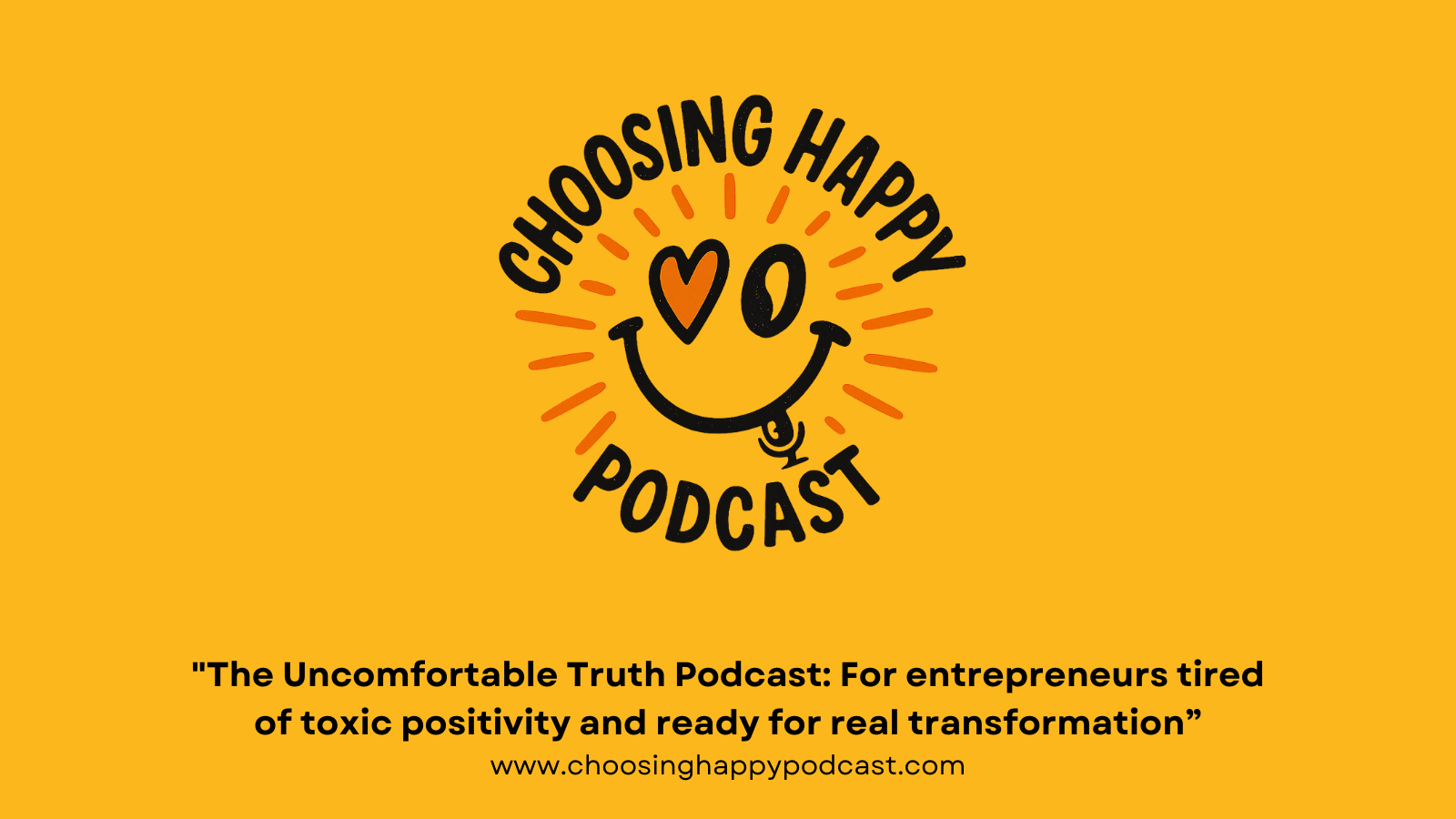Your Fear Is Fake - Here's What's Really Stopping You
Your Fear Is Fake - Here's What's Really Stopping You
Let’s dive into the good stuff right off the bat: this week, we're tackling the sneaky shame monster lurking in the corners of our minds and how it's been running the show more than we'd like to admit.
I’m Heather Masters, and trust me, if you’ve ever felt like you’re not good enough or you’ve sabotaged your own success, you’re not alone—this is the kind of chat we all need!
We’re peeling back the layers on why shame is often the real culprit behind our fears, and spoiler alert: it’s not just about the fear of failure, it’s way more personal.
So, grab your favourite drink, get cosy, and let’s unpack how we can kick shame to the curb with some practical tips that'll have you strutting into your greatness like the fabulous human you are!
Plus, I’ve got some exciting news about our new thrice-weekly schedule coming up, because let’s face it, we all need more joy and less shame in our lives!
The Details:
Ready for some real talk that might just bust your brain wide open?
Heather Masters is back with a fiery episode that’s as enlightening as it is entertaining.
She tackles the oh-so-awkward topic of shame, which, let’s be honest, can feel like that one friend who always shows up at the worst times—like when you’re about to crush it and then suddenly think maybe you should just hide under a rock instead.
Heather shares her own battle with shame, showing us that it’s not about running from fear but rather recognising shame for what it is: the sneaky little gremlin that keeps us small.
With humour and heart, she breaks down the shame spiral, complete with the steps that lead us from feeling bad about ourselves to self-sabotage city. But fear not! Heather arms us with five actionable strategies to confront and dismantle our shame, from having a heart-to-heart with a trusted friend to keeping a wins jar to celebrate all those glorious little victories we often overlook.
If you’re ready to flip the script on how you see yourself and embrace the beautiful mess that is being human, this episode is your golden ticket to a happier you!
Takeaways:
- Shame often masquerades as motivation, but it actually paralyses us instead of propelling us forward.
- The difference between fear and shame is crucial; fear looks to the future, while shame attacks our present worth.
- Practicing self-compassion can counteract the harsh judgments that shame imposes on us, so treat yourself like your best friend.
- Recognising and celebrating even the smallest wins nurtures a positive self-image and helps combat shame's negative narratives.
Links referenced in this episode:
Chapters:
- 00:17 - The Shame Game
- 05:01 - Understanding the Shame Spiral
- 07:39 - Understanding and Overcoming Shame
- 10:18 - Embracing Self-Compassion to Combat Shame
- 14:14 - Celebrating Wins and Overcoming Shame
Let me know your biggest takeaways from this episode!
Share on social and please like, share and subscribe. It really helps the podcast, and I so appreciate it!
----------------------------------------------------------------------
If you would like more content like this sign up for my Sunday Newsletter and Join our community who are redefining what it means to thrive in the NEW world. Click here to subscribe:
https://www.heathervmasters.com/sundaynewsletter
You can find the Pattern Breaker Coaching Program:
www.choosinghappy.co.uk/pattern-breaker
Podcast Details and Links
Heather Masters
Copyright 2026 Heather Masters
If you are enjoying the podcast and would like to donate you can do so here: (Thank you in advance)
Links referenced in this episode:
Drop me an email if you would like to explore bespoke mindset and happiness coaching. heather@heathervmasters.com
You can find the Pattern Breaker Coaching Program:
www.choosinghappy.co.uk/pattern-breaker
What you can do now...
Join the new community at www.choosinghappy.co.uk/community
You can buy me a coffee here: www.buymeacoffee.com/heatherv
Copyright 2025 Heather Masters
If you are enjoying the podcast and would like to donate you
can do so here: (Thank you in advance)
Support this Podcast (https://www.choosinghappypodcast.com/support)
Transcript
Hello and welcome to this week's Choosing Happy Podcast.
Speaker A:I'm Heather Masters, the founder, and today we're digging into something really close to my heart.
Speaker A:It's something that I've struggled with in the past, and I'm sure many people do without even realizing it.
Speaker A:So stay tuned to find out all about the shame game in this week's Choosing Happy Podcast.
Speaker A:Foreign people.
Speaker A:And welcome back to the Choosing Happy Podcast.
Speaker A:I'm Heather, and before we dive into today's juicy topic, I've got some exciting news from next week.
Speaker A:I'm relaunching with a proper schedule three times a week because there's too much transformation and change happening in the world of nlp, hypnosis, energy, work and coaching, coaching and business for us to only chat once in a blue moon.
Speaker A:I'm keeping the name because let's be honest, Choosing Happiness is still the end game.
Speaker A:It's still the purpose of all of this.
Speaker A:But I'm cranking up the energy and getting laser focused on what really matters for transformational practitioners like us.
Speaker A:So think less fluffy self help, more practical truth telling for coaches, consultants and healers who are ready to do real work and grow their practices.
Speaker A:So today I'm diving into something that's been lurking not just in my inbox, but in the back of my mind, like an uninvited guest at a dinner party.
Speaker A:You know, over the past few weeks, we've been looking at self sabotage.
Speaker A:Well, why do I keep sabotaging myself just when things are going well?
Speaker A:It's a repeating pattern.
Speaker A:It's showing up not just in my inbox, but in conversations.
Speaker A:And you know what?
Speaker A:Every time someone asks me about it, I can practically hear the shame monster munching away in the background.
Speaker A:Because here's what I've learned, not just from others, but about myself.
Speaker A:After years of working with brilliant master trainers, entrepreneurs and creatives, it's not fear that's stopping you from showing up fully.
Speaker A:Fear is just the noisy cousin, the real puppet master.
Speaker A:It's oftener.
Speaker A:It's shame.
Speaker A:So grab your cuppa, get comfy, and let's have a proper chat about why shame is probably running more of your life than you'd like to admit, and more importantly, what we're going to do about it in this week's Choosing Happy Podcast.
Speaker A:Right, let's get something straight from the off.
Speaker A:We love to say we're afraid of failure, of success, of being seen, of speaking up, of.
Speaker A:But here's the uncomfortable truth nobody wants to tell you.
Speaker A:Most of the time it's not fear at all.
Speaker A:It's shame.
Speaker A:And when we keep chasing fear, we keep allowing the patterns to continue.
Speaker A:Fear says, what if I fail?
Speaker A:Shame whispers, you're not good enough to succeed anyway.
Speaker A:Fear says, what if people don't like it?
Speaker A:Shame hisses, you're fundamentally unlovable.
Speaker A:See the difference?
Speaker A:Fear is about the future.
Speaker A:Shame is about you right now, as you are.
Speaker A:And shame, well, shame's a proper tyrant that can keep us small, can keep us procrastinating, and keep us from achieving our dreams.
Speaker A:Do you recognize this scenario?
Speaker A:You're working with a client, or maybe you've experienced this for yourself?
Speaker A:I know I have.
Speaker A:Anyway, this client is brilliant at what they do, yet every time they get close to a breakthrough, they find a way to mess it up.
Speaker A:They miss important calls, forget to follow up on massive opportunities, fail to stay consistent, and basically shoot themselves in the foot with remarkable consistency.
Speaker A:And I particularly notice this around money with myself and others.
Speaker A:Whether it's earning money, spending money, it's the relationship with money.
Speaker A:And I've had times where I notice myself self sabotaging amazing opportunities because I think I don't trust myself to deliver.
Speaker A:After all, who am I to succeed at this level?
Speaker A:Now, clients and me often think they're afraid of success.
Speaker A:But when we dig deeper, what we might find is this crushing sense of, I don't deserve this.
Speaker A:That's shame, not fear.
Speaker A:Let's talk about the Perveza's shame spiral.
Speaker A:Now, here's how the shame spiral works, and I'll bet you recognize this pattern.
Speaker A:Number one, something happens or it doesn't happen.
Speaker A:Number two, shame pipes up that voice in our head that says, see, you're rubbish.
Speaker A:Number three, you feel awful about yourself.
Speaker A:Number four, you either hide away or self sabotage.
Speaker A:Number five, this proves you were right to feel ashamed.
Speaker A:Number six, rinse and repeat.
Speaker A:It's like having a really nasty flatmate in your head who never pays rent but always has something critical to say about your life choices.
Speaker A:The particular sneaky thing about shame is that it masquerades as motivation.
Speaker A:I'll just be really hard on myself and I'll do it better next time.
Speaker A:I know that one.
Speaker A:Because I can be really hard on myself.
Speaker A:I can be really tough and push myself to do things.
Speaker A:But shame isn't motivating as paralyzing.
Speaker A:It's the difference between a coach who believes in you and pushes you forward and a bully who keeps you cowering in the corner.
Speaker A:And here's where it gets really messy.
Speaker A:When shame's running the show.
Speaker A:We stop trusting ourselves.
Speaker A:I mentioned earlier my not trusting myself.
Speaker A:We second guess every decision, every instinct, every brilliant idea.
Speaker A:We start looking outside ourselves for validation, for someone else to tell us we're okay and we're doing okay and we're doing the right thing.
Speaker A:But here's the thing, and this might sting a bit.
Speaker A:Nobody else can fix your relationship with yourself.
Speaker A:They can tell you you're amazing until you're blue in the face.
Speaker A:But if shame's got its claws in you, you think they're just being polite, right?
Speaker A:I see this all the time, sometimes even with myself, but also with other entrepreneurs and creatives.
Speaker A:They'll achieve something incredible.
Speaker A:And instead of celebrating, they'll immediately start looking for evidence that it was a fluke, that they don't really deserve it, that they're about to be found out as a fraud.
Speaker A:I've seen it, especially with myself, when I've taken leadership roles.
Speaker A:No matter how successful I was, I was looking for the other shoe to fall or to be found out.
Speaker A:And of course, it was a self fulfilling prophecy.
Speaker A:Does it sound familiar?
Speaker A:Can you relate?
Speaker A:Right, enough doom and gloom.
Speaker A:Let's get practical, shall we?
Speaker A:Here are five things you can start doing today to show shame the door number one is what I like to call the Shame audit.
Speaker A:Get curious about your shame instead of trying to bash it over the head.
Speaker A:And we've talked about welcoming before.
Speaker A:So when you notice that familiar feeling of I am rubbish, stop and ask what story am I telling myself right now?
Speaker A:And write it down.
Speaker A:And I mean it.
Speaker A:Take time to write it down.
Speaker A:Don't judge it.
Speaker A:Don't try to fix it.
Speaker A:Don't try to dig or excavate it.
Speaker A:Just notice it.
Speaker A:Shame loses a lot of its power when it's dragged into the light.
Speaker A:It's like a vampire.
Speaker A:It can't stand the sunshine or the beam of light shining on it.
Speaker A:So try this.
Speaker A:Keep a little notebook for about a week, and every time you catch shame having a go at you, jot down what triggered it and you'll start to see patterns.
Speaker A:And patterns, as we know from previous episodes, can be interrupted.
Speaker A:And if you want to go a little bit deeper, create a journal or a mindfulness practice that you do daily to reflect on past experiences or expectations that contribute to you feeling shame.
Speaker A:By bringing shame into the light, you can begin to separate it from your sense of self and understand it as a response rather than a defining trait.
Speaker A:And for your coaching practice, you can guide clients to journaling prompts such as when do I most Feel ashamed or what past experience contributes to this feeling?
Speaker A:Number two is the reality check chat.
Speaker A:So find someone you trust, a friend, a partner, a therapist, a coach, and have an honest conversation about your shame stories.
Speaker A:Say the shameful thing out loud to another human being.
Speaker A:I know, I know.
Speaker A:Your shame is having a real panic attack right now.
Speaker A:We can't tell them that.
Speaker A:They'll know we're a fraud.
Speaker A:But here's the magic.
Speaker A:When you speak your shame out loud to someone who cares about you, you'll often hear how absolutely bonkers it sounds.
Speaker A:The story that feels so real and devastating in your head suddenly seems, well, a bit silly, actually.
Speaker A:A bit over the top, a bit dramatic.
Speaker A:Now, number three is the compassion swap.
Speaker A:What would you say to your best friend if they came to you with the exact same shame story?
Speaker A:Would you say, yeah, you're right, you really are a bit rubbish?
Speaker A:Of course you wouldn't.
Speaker A:You'd probably give them a hug and tell them they're being far too hard on themselves.
Speaker A:So why are you treating yourself like the worst enemy instead of your best friend?
Speaker A:Try this.
Speaker A:When shame starts its nasty commentary, imagine your best friend is sitting next to you.
Speaker A:What would they say then?
Speaker A:Say that to yourself instead.
Speaker A:And yes, you might feel a bit daft talking to yourself at first, but do it anyway.
Speaker A:Remember that self compassion is a powerful antidote to shame, and it counters harsh judgments that often accompany it.
Speaker A:And it's the harsh judgment that we really want to let go of.
Speaker A:Number four is the evidence examination.
Speaker A:Shame loves to deal an absolute.
Speaker A:You always mess up.
Speaker A:You never get it right.
Speaker A:You're completely useless.
Speaker A:But shame is a terrible detective.
Speaker A:It cherry picks evidence and ignores anything that doesn't fit its narrative.
Speaker A:So let's get scientific about it.
Speaker A:When shame says you are always mess up, ask for the evidence.
Speaker A:Make a list of the times you didn't mess up.
Speaker A:Make a list of times you did brilliantly, especially in the recent past.
Speaker A:Make a list of the times you learned from mistakes and did better.
Speaker A:Shame can't argue with facts.
Speaker A:Well, it can try, but it looks a little bit silly doing it.
Speaker A:And again, it's about that judgment.
Speaker A:It's about about learning to let go of judgment and just saying to yourself, yes, I made a mistake.
Speaker A:And let's face it, making mistakes is how we learn.
Speaker A:And the faster we fail, the faster we learn and are more successful.
Speaker A:So allow yourself to make mistakes without allowing it to define you.
Speaker A:So number five is the small wins celebration.
Speaker A:And I mentioned this a lot in my previous episodes because I think it's something that's crucial.
Speaker A:Start celebrating your small wins.
Speaker A:Not just the big obvious ones, but the tiny ones too.
Speaker A:Whether you've answered a difficult email, celebrate.
Speaker A:Whether you've had a shower when you didn't want one, time for celebration when you chose not to be horrible to yourself for five whole minutes.
Speaker A:Real celebration.
Speaker A:Celebrate all of the smaller wins because it teaches your unconscious mind to look for more.
Speaker A:And also shame thrives on scarcity.
Speaker A:It convinces you that you're not good enough, that you haven't achieved enough, that you don't deserve good things.
Speaker A:But when you start noticing and celebrating the small wins, you're building evidence that you are in fact capable and worthy.
Speaker A:You have to commit to celebrating and keeping commitments to yourself is where change really starts.
Speaker A:It teaches your unconscious mind that you're really serious.
Speaker A:Keep a winds jar and have fun with it.
Speaker A:Decorate it, make it yours and write down those celebrations and add them to the jar.
Speaker A:Alternatively, you can keep a done list instead of just a to do list so so that you can celebrate those wins and make sure that you look at them a number of times each day, especially when you complete something that's out of your comfort zone or that you've been putting off for ages, but you do it anyway.
Speaker A:Remember, no win is too small and watch how it changes your relationship with yourself and with your success.
Speaker A:Look, I'm not going to lie to you and say shame will disappear overnight.
Speaker A:It's been with you a long time, often from childhood, and it's got some pretty strong opinions about its job security.
Speaker A:But shame isn't the boss of you, even when it feels like it is.
Speaker A:The truth is, we all have shame.
Speaker A:It's part of being human.
Speaker A:But the difference between people who thrive and people who stay stuck is this.
Speaker A:The thrivers have learned to recognize shame for what it is.
Speaker A:Little troll, let's try and keep them safe by keeping them small.
Speaker A:And talking of trolls, check out the book Taming your Gremlin by Richard David Carson.
Speaker A:If any of this resonates and you want to explore things further, you don't have to believe everything shame tells you.
Speaker A:You don't have to let it drive the bus.
Speaker A:And you definitely don't have to let it stop you from showing up as the brilliant, complex, wonderfully imperfect human that you are.
Speaker A:Remember, you're not broken.
Speaker A:We said this last week.
Speaker A:You're not too much.
Speaker A:You're not.
Speaker A:Not enough.
Speaker A:You're just a human doing the best with the resources you have.
Speaker A:And that's actually pretty amazing, right?
Speaker A:Then that's your homework for this week to pick one of those five strategies and give it a go.
Speaker A:And if shame tries to tell you that you're doing it wrong, just smile and say.
Speaker A:Thanks for sharing, but I'm not taking advice from someone who's never been right about anything.
Speaker A:And don't forget, from next week we're back with our new three times a week schedule.
Speaker A:Monday, Myth Busting, Wednesday, Real Wins, and Friday.
Speaker A:Well, let's just say Friday is going to be interesting.
Speaker A:It's all designed specifically for transformational practitioners who are ready to level up their game and their impact and grow their business.
Speaker A:If this episode has resonated with you, please do share it with someone who might need to hear it.
Speaker A:And if you want to continue this conversation, come and Find me on LinkedIn or Facebook.
Speaker A:I love hearing from you.
Speaker A:Until next time, keep choosing Happy or at least choosing to be kind to yourself.
Speaker A:Same thing, really.
Speaker A:Thank you so much for taking the time to listen to this week's episode.
Speaker A:If you enjoyed it or think it would be valuable to others, please do share.
Speaker A:And if you really enjoyed it, please leave me a review.
Speaker A:It really helps the podcast.
Speaker A:All of the links are in the show notes, and I look forward to seeing you next week on the Choosing Happy podcast.



